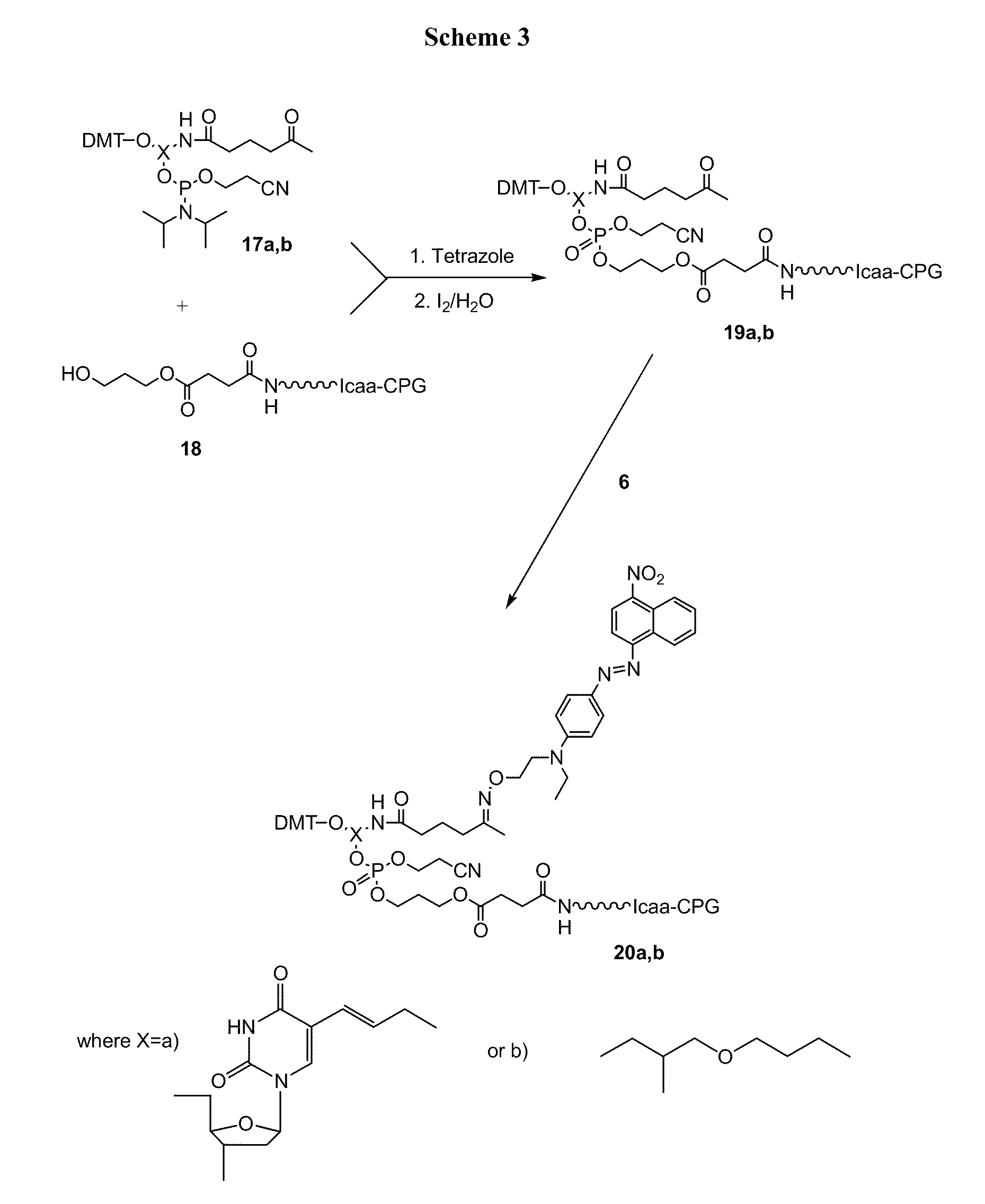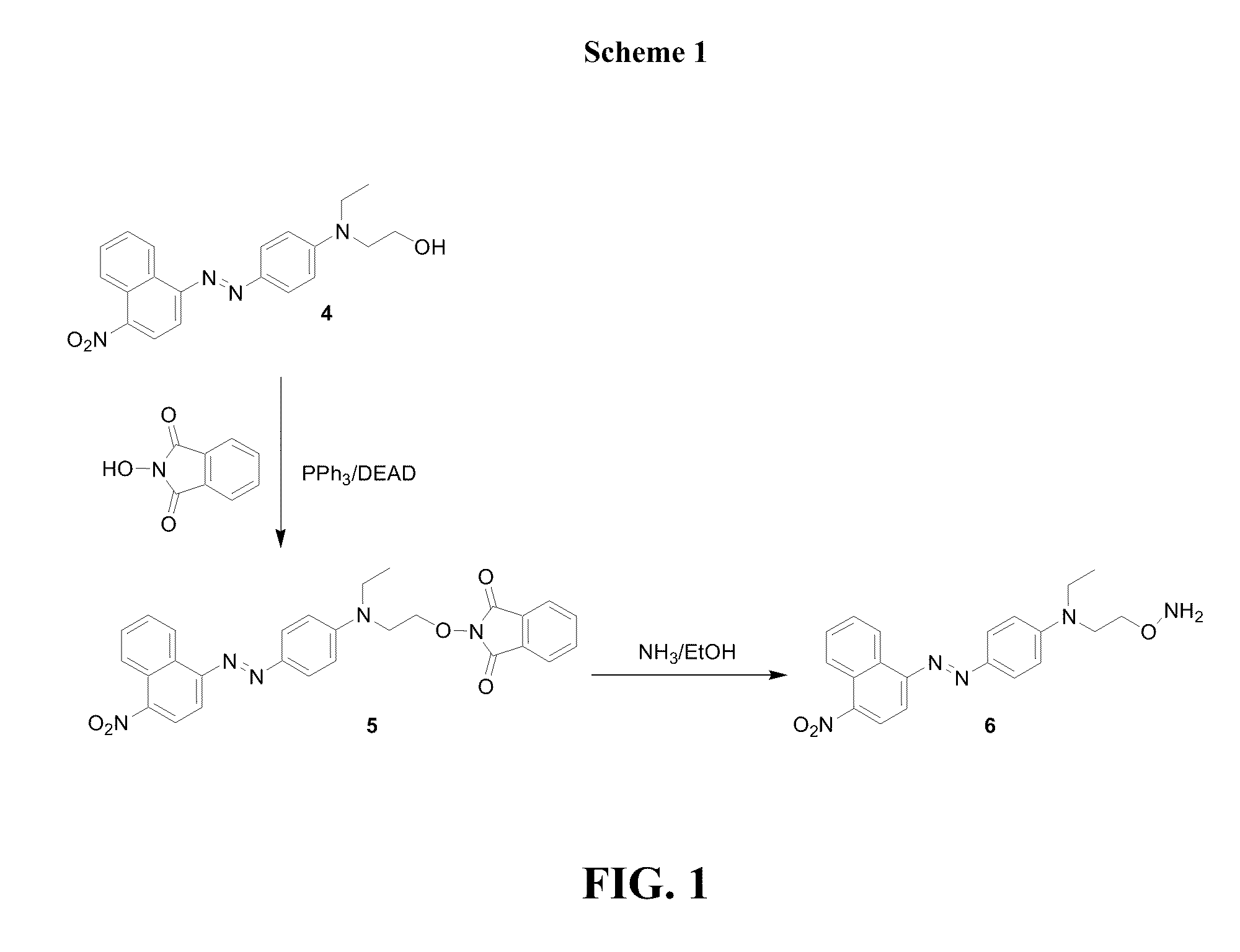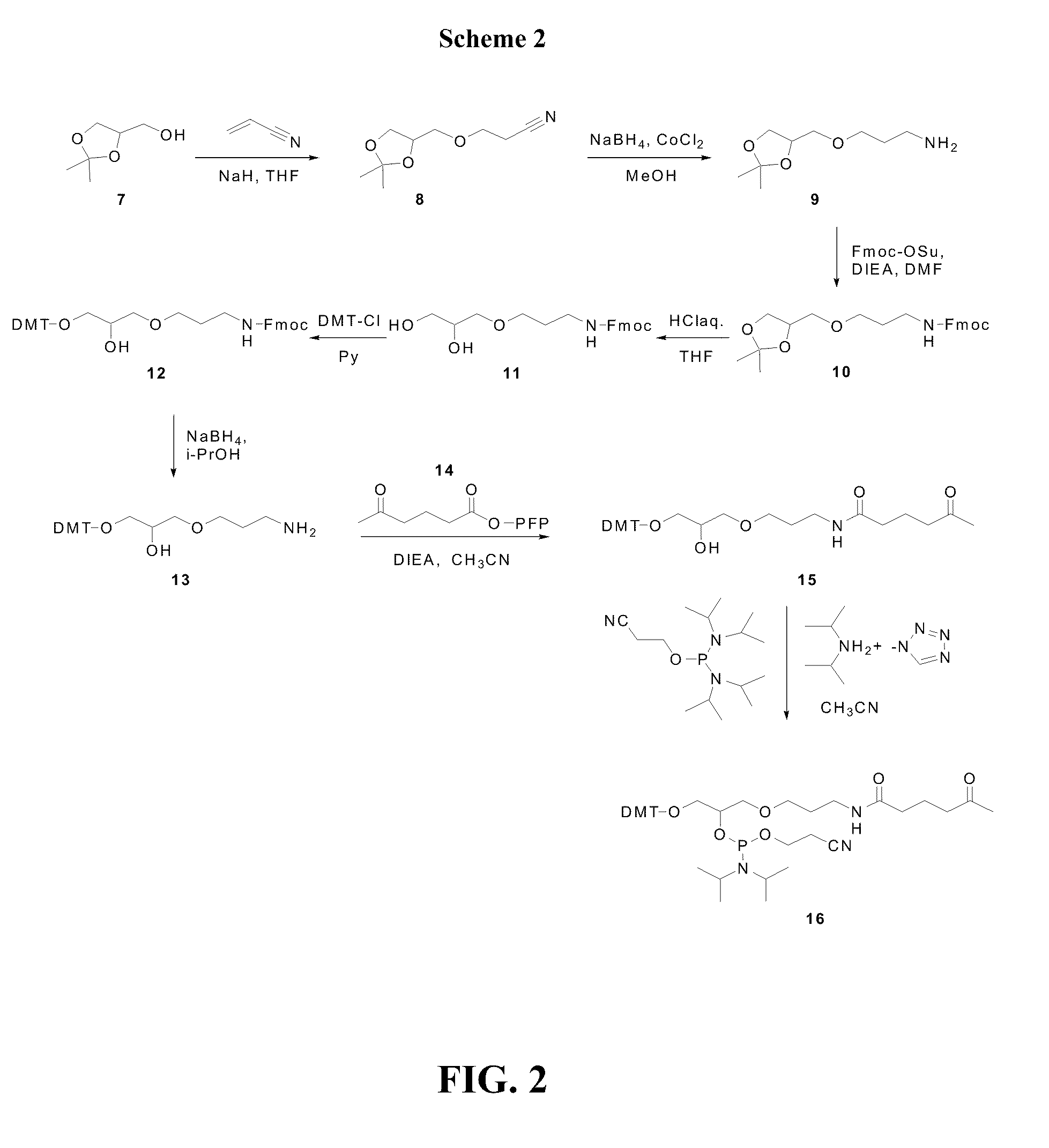Compounds and methods for labeling oligonucleotides
a technology of oligonucleotides and compounds, applied in the field of compound and method for labeling oligonucleotides, can solve the problems of limiting the method to the post, the proposed method has not been commercially viable alternative to standard synthesis approaches, and the requirement complicates the design of probes that utilize frets
- Summary
- Abstract
- Description
- Claims
- Application Information
AI Technical Summary
Problems solved by technology
Method used
Image
Examples
example 1
Synthesis of Aminooxy Activated (1-nitro-4-naphthylazo)-N,N-diethanolaniline Quencher (6)
[0076]
[0077]Synthesis was performed as shown in Scheme 1 in FIG. 1. To the solution of 0.36 g (0.1 mmol) alcohol (4), 0.17 g (0.1 mmol) N-hydroxy-phthalimide, and 0.27 g (0.1 mmol) of triphenylphosphine in 10 mL of THF was added 0.18 mL (0.1 mmol) of diethylazodicarboxylate (DEAD). After overnight stirring the reaction mixture was concentrated under diminished pressure. Flash chromatography with 1:4 EtOAc / hexanes provided 150 mg of (5). TLC: Rf 0.75 (EtOAc / hexanes-60 / 40). 1H NMR (CDCl3) δ 9.04 (d, J=8.4 Hz, 1H), 8.68 (d, J=8.4 Hz, 1H), 8.34 (d, J=8.4 Hz, 1H), 8.03 (d, J=8 Hz, 2H), 7.7-7.9 (m, 7H), 6.85 (d, J=8 Hz, 2H), 4.46 (t, J=7.5 Hz, 2H), 3.92 (t, J=7.5 Hz 2H), 3.72 (q, J=8 Hz, 2H), 1.34 (t, J=8 Hz 3H).
[0078]The solution of 10 mg (5) in 2 mL of concentrated ammonia solution in ethanol was incubated overnight at 55° C. The solvent was removed under diminished pressure to provide (6) that was ...
example 2
Synthesis of Ketone Phosphoramidite (16)
[0079]
[0080]Synthesis was performed as shown in Scheme 2 of FIG. 2.
[0081]N-Fmoc-3-aminopropyl solketal (10): 3-Aminopropyl solketal (9) was synthesized starting from commercially available solketal (7) according to the procedure of Misiura et al (Misiura, K., Durrant, I., Evans, M. R., Gait, M. J. (1990) Nucleic Acids Research, v. 18, No. 15, pp. 4345-4354, which is incorporated herein by reference). (9) was used crude without vacuum distillation for the next step. The crude product (9) (12.85 g; 68 mmol) was dissolved in dry CH3CN (100 mL) with stirring. NaHCO3 (4.2 g; 50 mmol) was added followed by Fmoc-OSu (16.9 g; 50 mmol). The reaction mixture was stirred at room temperature overnight. The solvent was evaporated and the oily residue was partitioned between EtOAc (500 mL) and 5% NaHCO3 (150 mL). The organic layer was separated and washed with 5% NaHCO3 (2×150 mL), brine (150 mL), and dried over anhydrous. Na2SO4. The product (10) was isola...
example 3
Synthesis of Aminooxy Conjugated CPG Supports with (1-nitro-4-naphthylazo)-N,N-diethanolaniline Quencher (20a and 20b)
[0088]
[0089]Synthesis was performed as shown in Scheme 3 in FIG. 3.
[0090]Synthesis of ketone substituted controlled pore glass (CPG) supports: Spacer C3 CPG (2 g; 44 μmol / g) was placed in a 50 mL peptide synthesis reactor and detritylated by treating with several portions (30 mL) of 3% dichloroacetic acid in dichloromethane (until all the color was washed off the support). It was then washed with CH3CN (5×50 mL; last two times with anhydrous CH3CN) and “activator” (30 mL; 0.45 M 5-ethylthio-1H-tetrazole in anhydrous. CH3CN) under argon atmosphere. The CPG (18) was then treated with a solution of appropriate phosphoramidite (phosphoramidite (17a) which was synthesized according to published procedure: Dey, S. Shepard, T. (2001) Org Lett, v. 3, pp. 3983-3986) which is incorporated herein by reference; (250 μmol) in 10 mL of anhydrous CH3CN mixed with 10 mL of “activato...
PUM
 Login to View More
Login to View More Abstract
Description
Claims
Application Information
 Login to View More
Login to View More - R&D
- Intellectual Property
- Life Sciences
- Materials
- Tech Scout
- Unparalleled Data Quality
- Higher Quality Content
- 60% Fewer Hallucinations
Browse by: Latest US Patents, China's latest patents, Technical Efficacy Thesaurus, Application Domain, Technology Topic, Popular Technical Reports.
© 2025 PatSnap. All rights reserved.Legal|Privacy policy|Modern Slavery Act Transparency Statement|Sitemap|About US| Contact US: help@patsnap.com



